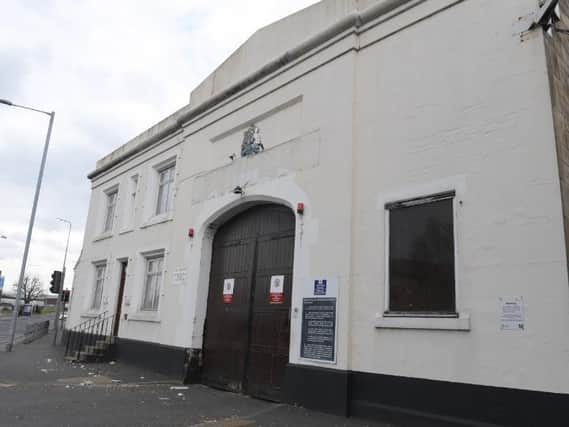"A prison sentence not a death sentence": concern grows over the potential for coronavirus to spread in Lancashire's prisons


The Ministry of Justice (MOJ) figures show that of the 650 prisoners at HMP Preston between 2018-19, 517 - 80 per cent - were living in crowded conditions.
The news comes as pressure is put on Justice Secretary Robert Buckland to allow convicted criminals to head home to prevent more coronavirus deaths in England and Wales’ crowded prisons.
Advertisement
Hide AdAdvertisement
Hide AdHowever, when approached by the Post this week, the MOJ refuted that HMP Preston was overcrowded, saying latest figures from February the population of 682 against an operational capacity of 811. No details were given for the number of shared cells.
Calls for action from human rights groups and a prisons watchdog came as the Ministry of Justice confirmed that 65 prisoners had tested positive for coronavirus in 23 different prisons, as of Monday, March 31.
Jails across England and Wales have been put on lockdown with all visits cancelled, however, it's feared that prison crowding could lead to jails becoming overwhelmed by the coronavirus pandemic.
Staff numbers in prisons are already stretched, with around 3,500 employees, representing about a tenth of the workforce, currently in self-isolation due to Covid-19.
Advertisement
Hide AdAdvertisement
Hide AdNationally, the prison overcrowding rate fell to 22.5 per cent in 2019, from 24.2 per cent in 2018.
Crowding was particularly concentrated in male local prisons, which usually serve a court in the local authority area and predominantly hold remand and short sentence prisoners.
This week the Independent Advisory Panel on Deaths in Custody said prisons should be only for “serious and violent offenders” at this time.
Juliet Lyon, IAPDC chairman, said: “In an unprecedented public health crisis, it is not fair or proportionate to commit prisoners, and staff responsible for them, to try to survive in insanitary, overcrowded institutions devoid currently of independent oversight.”
Advertisement
Hide AdAdvertisement
Hide AdKate Allen, director of Amnesty International UK, said that decreasing the prison population and the number of people in immigration detention centres is a “crucial means of slowing the spread of Covid-19”.
At the end of March, the Government announced that pregnant women in custody who don't pose a high risk of harm to the public would be temporarily released from prison on an electronic tag, to protect them and their unborn child from coronavirus.
A Prison Service spokeswoman said: "We have robust and flexible plans in place to protect the lives of our staff, prisoners and visitors, based on the latest advice from Public Health England and the Department of Health and Social Care."
HMP Preston houses male Category B prisoners.
These prisons are either local or training prisons.
Local prisons house prisoners that are taken directly from court in the local area (sentenced or on remand), and training prisons hold long-term and high-security prisoners.
What is it like in an overcrowded prison?
Advertisement
Hide AdAdvertisement
Hide AdCody Lachey, a former prisoner from Manchester, is now a prison reform campaigner. He has personal experience of being in an overcrowded prison and still speaks to prisoners up and down the country in the same situation.
He said: "Truth be told, all our prisons are overcrowded and its simply human warehousing of some of the most dangerous and violent offenders but also some of our most vulnerable and susceptible people about. In prison many people develop mental health issues, if they haven't already got them, and believe me thousands have."
He claims mental health services in prison are "inadequate" and this results in self harm, suicide attempts, and suicides.
He added: "Sadly the prison system, law and order within our prisons is hanging by a thread and our prisons have long been a powder keg. Sadly I fear that this Covid-19 could be the straw that breaks the camels back, as from speaking to the prisoners I know that tensions are growing, fuelled by treatment, conditions, 23 hour lock up, cancelled visits, prisoners begging to use the phone, begging for toilet roll, soap, medication, mental health and so on.
Advertisement
Hide AdAdvertisement
Hide Ad"It started with frustration but that is becoming panic and anxiety, and that is slowly becoming anger. There are pockets of violence and unrest within a prison system that is underfunded and overcrowded, and a staffing crisis due to coronavirus could heap further pressure onto our brave heroes in the NHS as riots would require police, ambulance and firefighters."
Reflecting on the advice that prisons should be only for “serious and violent offenders” at this time, Mr Lachey said it was " a common sense approach".
He said: "Releasing low risk offenders on release on temporary licence or tag will take the pressure off a prison system that was already bursting at the seams and it will ultimately save lives. It's also cost-effective as to house someone in prison costs approximately £3,061 a month and it costs approximately £166 to monitor someone on Home Detention curfew (HDC) known as tag, and the money saved would be better spent on personal protection equipment for our NHS, prison officers and prisoners.
"I know to release prisoners on tag or release on temporary licence (ROTL) won't be a popular with those law-abiding citizens that read this, but what they need to remember is 99 per cent of prisoners, unless serving a whole life tariff, will be released at some point and these prisoners are low-risk offenders and have earned the right to get that status. So there is no real risk to the wider public, and prisoners are given a prison sentence not a death sentence, which is what could potentially happen to these prisoners with underlying health problems."